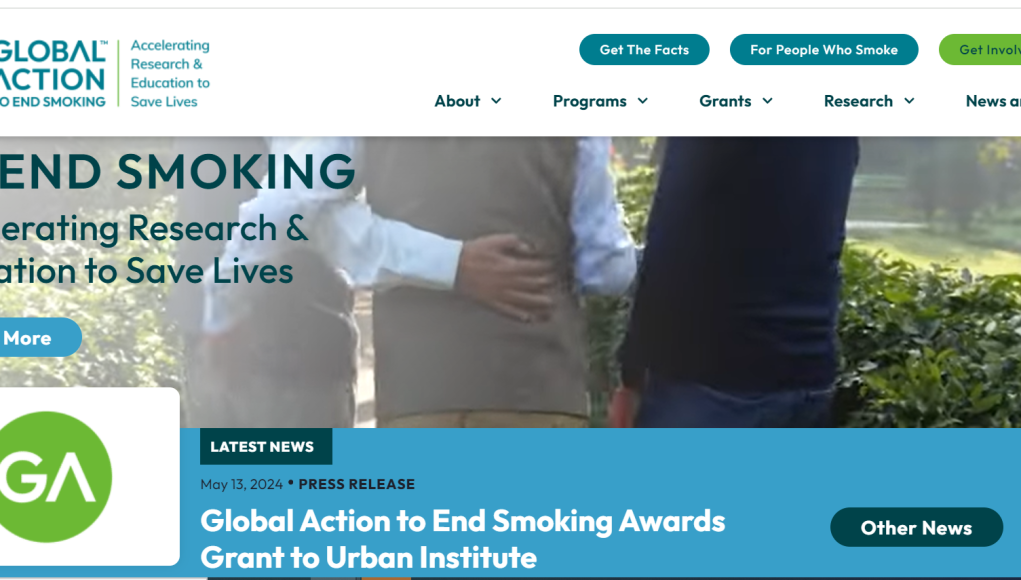The second phase of the new rebranding happened last week, when on the 13th of May, the Foundation’s name was officially changed to Global Action to End Smoking (GA). On the same day, the group also announced awarding a grant to the Urban Institute to study tobacco-use disorder and nicotine dependence among low-income individuals across the US.
Conducted by Urban’s Health Policy Center, the research aims to identify quitting challenges and propose solutions to reduce smoking rates and improve public health in marginalized communities. The study will analyze Medicaid data from 2019 to 2026 to assess smoking and vaping prevalence and the impact of Medicaid disenrollment on smokers. The findings will offer insights and recommendations for policymakers, health providers, and consumers.
This grant is the first under Global Action’s new Cessation Education program, which focuses on addressing quitting barriers and educating on smoking cessation, particularly in low- and middle-income countries (LMICs). Global Action’s rebranded mission continues to support health and science research while also promoting the transition of smallholder farmers from tobacco cultivation to sustainable livelihoods.
Will Cliff Douglas face the same fate as Derek Yach?
Meanwhile, a recent article on Stat, revealed that some of Douglas’s peers fear he might be going down the same path as his predecessor: former World Health Organization (WHO) executive Derek Yach. After taking the job as first president of the foundation, Yach faced severe ostracism, culminating in his ban from attending the WHO’s global tobacco conference in 2018, nonetheless held in his birth country, South Africa.
In fact numerous organizations declared their refusal to collaborate with Yach and the foundation, and not only did the WHO publicly state it would not partner with the foundation, but it also urged member countries to do the same. The American Cancer Society condemned the foundation’s efforts as an attempt to obscure tobacco’s role in global mortality and suffering. Similarly, deans from prestigious public health institutions, including Harvard and Johns Hopkins, refused to accept funding from the foundation due to its close association with an industry responsible for millions of deaths worldwide.
The opposition Yach faced was intense and well-coordinated, with significant financial backing. And critics of Douglas predict he might face similar consequences. The infamous Stanton Glantz, a retired researcher from the University of California, who is renowned for all the wrong reasons, noted that following a distinguished career at the WHO and in South Africa, as a leader in tobacco control, Yach ultimately damaged his reputation. Glantz believes Douglas is on a similar path.
Perhaps more surprising is the fact that even Douglas’s staunch supporters expressed concern over his decision. Michael Cummings, a professor at the Medical University of South Carolina and frequent co-author, described the move as courageous but admitted advising against it, fearing it would tarnish Douglas’s otherwise stellar reputation.
The fact that ties with the tobacco industry were severed should change everything
Douglas, however, maintains that his situation differs significantly due to his lack of a relationship with the tobacco industry. He frequently cites the new agreement with PMI pointing out that he compelled the company to “throw the money over the wall, turn around, and walk away,” underlining the fact that no one else has made the effort to arrange such an unprecedented agreement over a long period.
Echoing Douglas’s optimism, a spokesperson for Global Action to End Smoking told Vaping Post that the feedback received regarding the rebranding has been positive. “We have been pleased with the positive reception to our new website and the announcement of our grant to the Urban Institute, and we look forward to working with like-minded research organization committed to social justice through ending the global smoking epidemic.”













Who cares? In terms of transparency, they did not even tell how much their first grant to the Urban Institute was. They got $140 million from PMI, ie from the people smoking PMI products.Who will decide how to use those millions? What type of accountability, if any, is going to be put in place? Any independent performance review of the previous years and hundreds of millions disbursed? I am frustrated because this is still the biggest amount of money supposedly devoted to help smokers quit, with zero accountability or real transparency beyond what they are legally obliged to do: IRS 990 PF form once a year.